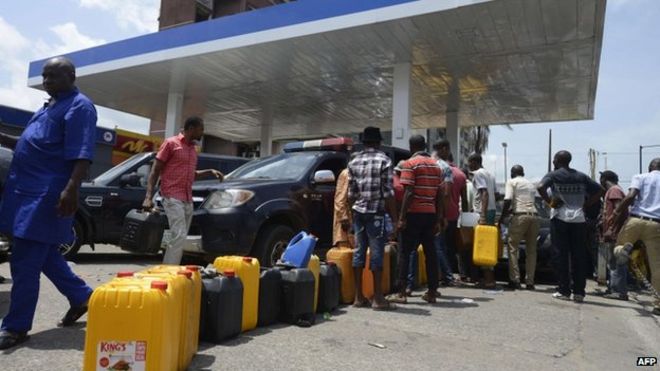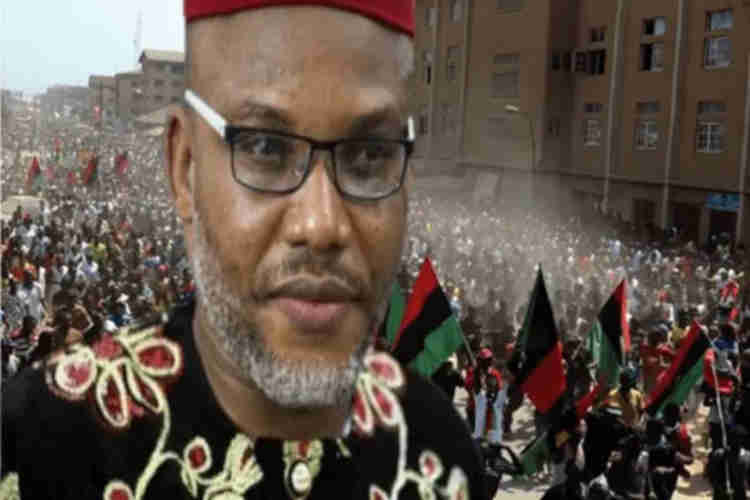Headlines
Fuel Subsidy Removal: FG, Labour Meeting Ends in Deadlock

Talks between the Federal Government and organised labour over the removal of fuel subsidy ended in a deadlock on Wednesday as they failed to reach a consensus following the hike in petrol pump prices to over N700 from N195 per litre by oil marketers.
The hours-long meeting which was held at the Presidential Villa was to, among other things, prevent a labour crisis following the recent increase in the petrol pump price occasioned by the discontinuance of petroleum subsidy.
Earlier on Wednesday, the Nigerian National Petroleum Corporation Limited said it had adjusted the pump price of Premium Motor Spirit to reflect the market realities. The agency, however, failed to state the new prices of petrol.
However, several retails outlets sold the product between 600 and N800 in Lagos, Abuja , Ogun and some other states.
The National Public Relations Officer, Independent Petroleum Marketers Association of Nigeria, Chief Chinedu Ukadike, pointed out that the hike in the cost of PMS would trigger galloping inflation in the country, stressing that some outlets in the South-East were currently dispensing the product at N1,200/l.
Ukadike stated, “Once NNPCL retail stations have adjusted their pumps to reflect the new price, there is nothing you can do about it; that is the new price. As I speak with you, all of them are now selling at the new prices. The situation is so bad, that somewhere in Ebonyi State our members informed us that it is now N1,200/litre.
“We thought the President would remove the subsidy through a seamless means because the source of this petrol is the NNPCL. They are the ones subsidising petroleum products, they are the people who use their revenue to subsidise this product.’’
The IPMAN spokesperson expressed worry over the rate of increase in inflation and hardship that would come as a result of the latest hike in petrol price.
“This hike in petrol price will definitely lead to galloping inflation and will worsen the hardship already being faced by the Nigerian masses. It is not something to cheer about. It came as a surprise and in the coming days, we will see the very harsh ripple effects,” he stated.
Meanwhile, Ukadike has called on the Federal Government and the NNPCL to give other marketers the opportunity to start importing petrol in order to create competition in the sector.
“The NNPCL is importing and has not given people the opportunity to join them in importing so as to see whether private sector operators can import the product cheaper or not. So there is no competition. In a deregulated regime, there must be competition, everyone with capacity should be allowed to import,” the IPMAN official stated.
When asked whether other marketers could resume imports since the government had finally deregulated petrol prices, Ukadike replied, “Marketers can import, but let me tell you some of the factors militating against this. The first is that there won’t be availability of dollars.
“You will source your dollar from the parallel market and if you are not careful in doing this, and you go into the importation of petroleum products, you might not ‘come out of it alive’ at the end of the day.
“So what we are saying is that those advantages that NNPCL has, should be shared with other major importers of petroleum products. If it is through crude buy-back, they should let us know so that independent players such as IPMAN members can come together and be able to use it in the buy-back model.’’
He added, “For independent marketers, the most important thing is that there should be availability of petroleum products, and the government should open up the space for importers and investors to come in.”
NNPCL, the sole importer of petrol into Nigeria for several years running, confirmed the hike in petrol price in a statement and a new pricing template released to marketers nationwide.
But the move has sparked a groundswell of anger across the nation with the Nigeria Labour Congress demanding an immediate reversal of the decision.
The union also said it would hold an emergency meeting on Friday on the fuel price increase which had triggered hoarding and scarcity across the country with attendant rise in transport fares, goods and services.
The fuel price hike by the oil firm is coming 72 hours after President Bola Tinubu declared in his inaugural address on Monday that the subsidy regime had ended.
To pacify the growing anger over the situation, the FG hastily summoned some labour leaders to a meeting at the Presidential Villa, Abuja, on Wednesday evening.
The meeting had in attendance the NLC President, Joe Ajaero and his Trade Union Congress counterpart, Festus Osifo, former NLC President and immediate past governor of Edo State, Adams Oshiomhole, Permanent Secretary, State House, Tijjani Umar, Head of Service of the Federation, Dr Folashade Yemi-Esan, Group Chief Executive Officer of the NNPCL, Mele Kyari, and others, however, ended in a deadlock as the labour and government teams failed to reach a consensus.
Speaking at the end of the meeting, Joe Ajaero, said “As far as labour is concerned, we didn’t have a consensus in this meeting.”
He faulted the NNPCL over an official release published hours earlier reviewing the petrol pump price in its filling stations nationwide.
He said the move puts the labour unions in a difficult position on the negational table.
“That’s the principle of negotiation. You don’t put the partner, ask them to negotiate under gunpoint. The prayer of the NLC is that we go back to the status quo, negotiate, think of alternatives and all the effects and how to manage the effects this action is going to have on the people. If it is an action that must take off.
“The subsidy provision has been made up to the end of June. And before then, conscious people, labour management, and the government should be able to think of what will happen at the end of June. You don’t start it before the time,” Ajaero said.
The Punch
Headlines
Nnamdi Kanu Bags Life Imprisonment, Denied Access to Communication Gadgets

By Eric Elezuo
The Federal High Court in Abuja has sentenced the leader of the Indigenous People of Biafra (IPOB) to life imprisonment, having been found guilty and convicted of all the seven count charges of terrorism brought against him by the Federal Government.
Delivering his judgment, the presiding judge, Justice James Omotosho, said the offences for which Kanu was found guilty carry a death sentence, but out of magnanimity, and in carrying out the example of Jesus Christ in showing mercy, he has decided to commute it to life imprisonment.
Headlines
Inciting Broadcast, Sit-at-Home, Others: Court Finds Nnamdi Kanu Guilty

The Federal High Court in Abuja on Thursday has convicted the leader of the proscribed Indigenous People of Biafra (IPOB), Nnamdi Kanu, for issuing “sit-at-home” orders that led to the closure of banks, schools, and economic activities across the Southeast, particularly on Mondays.
The court described the actions as “terrorist acts against Nigeria.”
Justice James Omotosho delivered the conviction while reading his judgment in Kanu’s ongoing trial on alleged treasonable felony and terrorism charges brought by the Federal Government.
Recall that Justice Omotosho had earlier dismissed Kanu’s no-case submission, ruling that prima facie (at first sight) evidence had been sufficiently provided by the Department of State Services (DSS), requiring “some explanation” from Kanu. However, Kanu refused to enter a defence and was eventually foreclosed after multiple adjournments.
The Federal Government accused Kanu of issuing threats via broadcasts across Nigeria, warning that anyone who flouted the sit-at-home order in the Southeast would face consequences, allegedly inciting insurrection against the state.
The prosecution further claimed that, due to Kanu’s directives, banks, schools, markets, shopping malls, and petrol stations in the Southeast remained mostly closed on Mondays. Kanu denied the allegations in the original 2015 case, paving the way for trial; however, the case commenced afresh before Justice Omotosho in 2025.
What the Court Said
Justice Omotosho held that since Kanu’s defence had been foreclosed, the court would rely solely on the prosecution’s evidence and several affidavits placed before the court.
The judge stated that anyone involved in acts of terrorism is liable, upon conviction, to life imprisonment.
He described terrorism as actions or threats of violence that create fear, especially when innocent people are targeted.
He noted that, in several broadcasts—including an interview with Sahara TV—Kanu threatened harm against the Federal Government and Nigerians, including members of his “own people.”
The judge quoted Kanu describing Nigeria as a “zoo” and referring to the Southeast as “Biafra.” He added that Kanu was fully aware of his actions, which could be inferred from his conduct.
For Count 2, relating to the sit-at-home directive that shut down banks and schools, the judge cited prosecution evidence showing that Kanu, on May 30, 2021, threatened to shut down the Southeast, including economic and educational sectors.
The court held that every Nigerian citizen is entitled to personal liberty and freedom of movement, noting that the people of the Southeast cannot be compelled to sit at home by Kanu, who holds no constitutional authority.
“The defendant, Kanu, is not the President of Nigeria and therefore lacked the power to impose sit-at-home orders on any part of the country. The act is not only unconstitutional but amounts to terrorist activity,” the judge ruled, convicting him on Count 2.
On Count 3, which relates to Kanu’s leadership of IPOB, the judge convicted him for leading a proscribed organization.
On Counts 4 and 5, which involve incitement of people to commit acts of terrorism against the state—offences liable to a death sentence—the judge agreed with the prosecution that Kanu encouraged attacks on security agents, institutions, and government property, citing instances where he allegedly called for the burning of Murtala Muhammed Airport and other facilities.
The court condemned Kanu’s behaviour, describing it as “evil”, highlighting that such an individual does not deserve to live within society.
He also convicted Kanu for inciting anarchy against Nigeria.
Source: Nairametrics
The court also found Kanu guilty and convicted him on Count 6.
Headlines
Trump Doesn’t Make Empty Threats, US Congressman Warns Nigerian Delegates

US Congressman, Riley M. Moore, has met with a delegation of senior members of the Nigerian government.
The delegation was led by Nigeria’s National Security Adviser, Nuhu Ribadu, and took place in Washington, D.C.
Top on the agenda were discussions about the alleged ongoing persecution of Christians and ongoing terrorist threats in Nigeria.
They also spoke about opportunities for strengthened cooperation and coordination between the US and Nigeria to end the bloodshed.
During the meeting, Nigerian officials shared their government’s challenges and concerns regarding counterterrorism, security assistance, protection of vulnerable communities, and ongoing issues involving violence across Nigeria.
Congressman Moore reiterated America’s readiness to cooperate with Nigeria, and that President Trump will not tolerate continued violence against Christians or other forms of religious persecution.
He also warned that Trump does not make idle threats.
“President Trump and Congress are united and serious in our resolve to end the violence against Christians and disrupt and destroy terrorist groups within Nigeria,” Moore said in a statement.
“I urge the Nigerians to work with us in cooperation and coordination on this critical issue.”
The delegation included:
Mallam Nuhu Ribadu – NSA and Leader of the Delegation
Her Excellency, Bianca Ojukwu – Minister of State for Foreign Affairs
Mr. Kayode Egbetokun – Inspector General of Police
Chief Lateef Olasunkami Fagbemi, SAN – Attorney General of the Federation
General Olufemi Olatunbosun Oluyede – Chief of Defence Staff
Lt. Gen. EAP Undiendeye – Chief of Defence Intelligence
Ms. Idayat Hassan – Special Adviser to ONSA
Ambassador Ibrahim Babani – Director of Foreign Relations, ONSA
Ambassador Nuru Biu – Acting CDA, Embassy of Nigeria and
Paul Alabi – Political and Economic Section, Embassy of Nigeria






